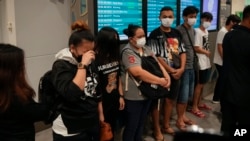Human rights groups in Malaysia say some 700 nationals may now be trapped in online scam centers across Laos under threat of beatings and electric shock if they fail to meet work targets or try to leave their guarded compounds.
The case highlights what the United Nations and others describe as a rising tide of young men and women being lured into — and trapped in — brutal online scam operations across the Mekong region of Southeast Asia.
The Malaysian International Humanitarian Organization says the number of nationals stuck in Laos is based on reports from some of the trapped victims it and two other Malaysian rights groups have been in contact with by phone and text over the past few months, plus a few who have managed to escape or negotiate their release.
“They’ve been tortured mentally and physically,” the group’s secretary-general, Hishamuddin Hashim, told VOA.
Hishamuddin said the victims are typically lured to Laos with social media ads for well-paid IT or casino jobs, only to be lockup up on arrival and forced to run a range of online love and investment scams on targets across the region and around the world, depending on their language skills. He said the victims report being watched around the clock by guards posted throughout the fenced-off compounds, including some with guns on the ground floors.
“If they don’t want to work, they will be beaten.... Some of them [have] been electrocuted … by electric shock,” he added, all “to force and to punish those who cannot achieve the target and those who want to return back to [their] home country.”
Besides forcing the victims to cheat unwitting targets out of their money, Hishamuddin added, some of the criminal syndicates are demanding ransoms ranging from $50,000 to $100,000 from the trapped workers’ families for their release. He said the Malaysian government refuses to pay the ransoms as a matter of policy, though he knows a few families that have paid partial deposits on demanded sums only to then lose contact with their children and their captors.
Hishamuddin said the rights groups have passed what they know onto Malaysian authorities, which have been in contact with their counterparts in Laos.
Malaysian authorities did not reply to VOA’s requests for comment, and a spokesman for the Lao government refused to be interviewed.
Hishamuddin said the Malaysians are trapped in compounds across Laos. While the victims don’t always know exactly where in Laos they are, he estimates that about half of them are likely being held inside the Golden Triangle Special Economic Zone in the country’s northwest, on the border with eastern Myanmar and northern Thailand.
The Golden Triangle SEZ has been an alleged hotbed of transnational organized crime for years. The U.S. Treasury Department sanctioned the man who runs it, Chinese national Zhao Wei, in 2018, placing him at the heart of a crime network laundering money for Myanmar drug lords and trafficking in everything from drugs to wildlife and people.
Zone officials did not reply to VOA’s requests for an interview, but Zhao has previously denied the allegations.
The Golden Triangle SEZ also gets repeated mention in the U.S. State Department’s latest Trafficking in Persons report, released in July. It says Lao authorities helped repatriate dozens of foreign nationals being forced to work inside the zone in 2021 and launched a special investigation into labor trafficking there early this year.
Winrock International, however, a U.S.-based aid group that runs development projects around the globe, says the Anti-Trafficking Department of the Lao government’s Ministry of Public Security is still debating whether to even post police officers at the zone.
“Things go slow here,” the head of Winrock’s anti-trafficking projects in Laos, Xoukiet Panyanounvong, told VOA.
Hishamuddin, whose group works specifically on migrant labor and trafficking issues, said he had heard reports of Malaysians trapped in Laos before, but never as many as 700 at once.
The Global Initiative Against Transnational Organized Crime, a non-government research group based in Switzerland, says the figure is plausible.
Lindsey Kennedy, a consultant for the Global Initiative, told VOA that the group’s researchers visited the Golden Triangle zone in May and believe thousands of people were being held against their will inside a single compound they found there.
“Volunteer rescue organizations have also told us that there are many similar options [operations] throughout the country, including in Vientiane,” she added, citing the Lao capital. “It is unclear how many of the people trapped are Malaysians, but a significant number of Malaysian people have been previously discovered at identical scam centers in Cambodia and Myanmar.”
These scam centers have been around for years, but Kennedy said they mushroomed over the course of the COVID-19 pandemic. Her group estimates they’ve now ensnared tens of thousands of young men and women across the Mekong region. Cambodia recently started cracking down, but Kennedy said it remains to be seen whether that will drive the criminal groups that run them out of business or merely out of the country to elsewhere, including Laos. Her group’s research has found some of the same people behind multiple special economic zones and casino towns hosting these centers in Cambodia, Laos, Myanmar and the Philippines.
Researchers and rights groups are convinced the trafficking could not be happening without government corruption.
Despite the U.S. sanctions, Zhao is pouring millions of dollars into expanding the Golden Triangle zone with the Lao government’s blessing. On October 1, the government even awarded him the state’s “Medal of Bravery, Second Class” for “his efforts and contribution to national defense and national public security,” local media reported.
“His continued operations do tend to suggest that he operates with political protection,” Kennedy said.
“There must be some people on higher level benefit from this,” Hishamuddin agreed. “These criminal people, they cannot do this without support by high-level authorities.”




